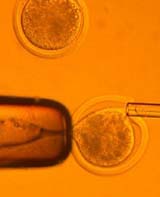Harvard launches effort to clone human stem cells
Harvard scientists announced yesterday that they are beginning an ambitious attempt to create the world's first cloned human embryonic stem cells, bringing the university into one of science's most ethically charged fields.

The goal of the research, they said, is to create a powerful new tool to explore the biology of, and hopefully find treatments for, a number of devastating diseases: juvenile diabetes, genetic blood disorders, and ALS, also known as Lou Gehrig's disease.
These goals are distant hopes because there is no assurance that cloned human embryonic stem cells can even be made. Although cloning has been used successfully in many animals, each species presents a unique set of technical challenges. Beyond the biological puzzles, there are practical obstacles, such as finding women who are willing to donate the eggs needed for cloning.
The research is controversial because scientists destroy days-old embryos, which some opponents say is essentially taking human lives, and because the research uses human eggs, which can place donors at a slight risk of side effects, reports Boston Globe.
According to People's Daily Online , the work will be conducted by two groups: one led by Douglas Melton, Co-Director of the Harvard Stem Cell Institute and a Harvard professor, and the other led by George Daley at the Children's Hospital in Boston, who is also an associate professor at the Harvard Medical School.
Melton's team will focus on diabetes-targeting stem cell lines, and then shift to neurodegenerative diseases such as Lou Gehrig's Disease. Daley's group will focus on blood disorders.
University leaders said they had carefully considered the ethical debates around stem cell study before approving the project.
Lawrence Summers, president of Harvard University, called the approvals "a seminal event in the University's effort to advance this tremendously promising area of science."
Steven Hyman, provost of the University, said the work had been the subject of "more than two years of thoughtful, intensive review by as many as eight different Institutional Review Boards and Stem Cell oversight committees at five different institutions."
The controversial research has been the subject of “more than two years of thoughtful, intensive review by as many as eight different Institutional Review Boards and Stem Cell oversight committees at five different institutions,” said Harvard University Provost Steven E. Hyman.
The extensive review was necessary because the research involves cloning human cells and destroying embryos. Some have criticized the work for its use of human eggs and the risk to egg donors, informs Boston Herald.
O.Ch.
Subscribe to Pravda.Ru Telegram channel, Facebook, RSS!




